Clash of Titans
Games featuring a future Hall of Fame coach on each sideline.
December 6, 1969: Texas @ Arkansas
Darrell Royal vs Frank Broyles
This clash between #1 Texas and #2 Arkansas is #9 on ESPN's "100 Moments That Have Defined College Football." For one day, Fayetteville AK was the center of the sports universe.
Both teams were 9-0, and Darrell Royal's Longhorns had won 18 in a row. The game would decide the Southwest Conference championship and a berth in the Cotton Bowl as well as clinching the top spot in the final regular season Associated Press poll. ABC TV executive Beano Cook had had the foresight before the season began to move the game from its October date to the first week of December. Another concession to TV was that the game began at noon local time to make sure it finished before dusk since Arkansas did not yet have lights on its field.
The game attracted dignitaries. Evangelist Billy Graham gave the pregame prayer. President Richard Nixon, a big football fan, flew in from Washington. Since the area didn't include an airport big enough for Air Force One, the president made the last leg of the journey via helicopter. Marine One landed on the practice field outside the stadium just as the game began. Nixon brought with him a plaque he would award to the winning team as national champion. Congressmen George H. W. Bush of Texas and John Paul Hammerschmidt of Arkansas accompanied the president.
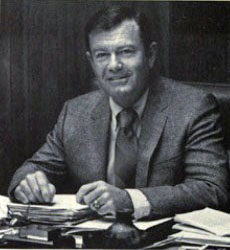
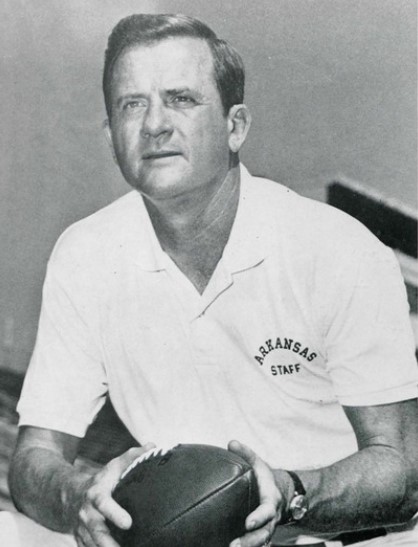
L: Darrell Royal (University of Texas Austin Cactus Yearbook - Class of 1970)
R: Frank Broyles (University of Arkansas Razorback Yearbook - Class of 1970)
Broyles and Royal, both exemplary Christian gentlemen, were fast friends off the football field. For 19 seasons, their teams had dominated the Southwest Conference, combining to win or share 18 championships. Each handed the other gut-wrenching defeats that cost the loser not only the conference crown but national championship contention.
Both men were intense competitors, but they never let the result of any game mar their friendship. They never talked football on the many family vacations they took together or the hundreds round of golf they played.
Royal warned his Longhorns: "They're gonna come after us with their eyes pulled up like BBs, and they'll defend every foot as if Frank has told 'em there's a 350-foot drop just behind 'em into a pile of rocks."
The Arkansas defense under Coach Charley Coffey led the nation in defense against scoring, allowing an average of only 7.6 points per game.
Featured Player
James Street arrived at Texas as a seventh-string quarterback in 1966. After playing only a handful of plays in two blowout games in 1967, Street started the 1968 season as the backup to Bill Bradley. That year, Coach Royal and assistant Emory Ballard introduced the wishbone offense. After a slow start in the second game, Royal told Street to replace Bradley, saying "Hell, you can't do any worse. Get in there."
The Longhorns lost the game despite scoring 22 points in the third quarter. So Royal kept Street at quarterback and was rewarded with 18 straight wins heading into the Arkansas game in 1969
Nicknamed "Slick" because of his good looks, flashy clothes, and ball-handling, Street developed a reputation as a cool customer under pressure who instilled confidence in his offense.
He was selected as the first team All Southwest Conference quarterback in 1969, but he was an even better baseball player. A two-time second team All-American pitcher, he posted a 29-8 record. He made the All-Southwest Conference team three years in a row and was the team's MVP every year.
Street was chosen in the 31st round of the 1970 Major League Draft by the Cleveland Indians, but after suffering an injury at the 1970 College World Series, he chose to retire from baseball. |
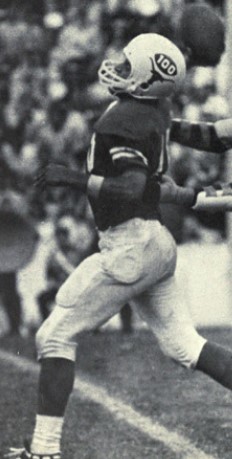 James Street (University of Texas Cactus Yearbook - Class of 1970) |
Turnovers Help Hogs
An overflow crowd of 44,000 watched a great game that lived up to its billing.
Texas HB Ted Koy fumbled on the Steers' second play of the game, and Arkansas recovered. "Cool and clever" QB Bill Montgomery hit WR John Rees for a 20y gain to the three. HB Bill Burnett hurled himself over the goal as the president's helicopter landed outside the stadium. Bill McClard booted the PAT. Arkansas 7 Texas 0
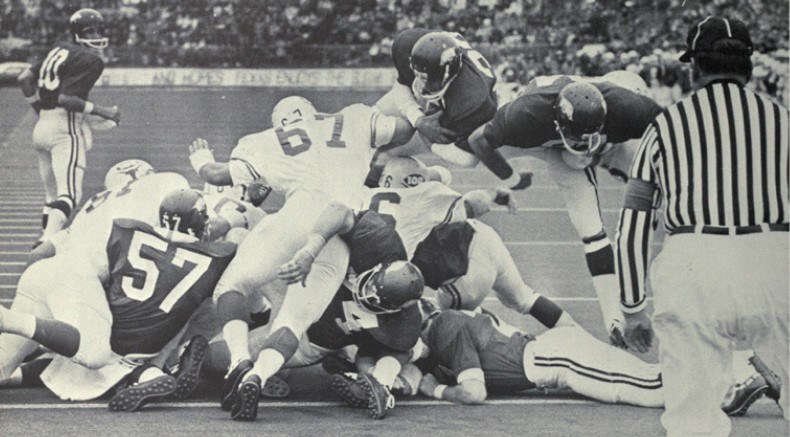
Bill Burnett jumps over the top for the first Arkansas touchdown.
(University of Texas Cactus Yearbook - Class of 1970)
After a scoreless second quarter, Montgomery struck again in the third period with a 29y touchdown pass to his roommate, E Chuck Dicus, to cap a 53y, five-play drive. Arkansas 14 Texas 0
Meanwhile, the Longhorns had never driven deeper than the Arkansas 31 as the Hogs obeyed their coaches' instructions to hold your position and don't miss tackles against the Texas wishbone, the second-best rushing team in college football history.
But QB James Street, who had won 18 straight games since becoming the Texas quarterback in the third game of the previous year, finally got the visitors on the board on the first play of the final period. Street recalled, "I remember fading back and having trouble finding Randy (Peschel). I could feel pressure and decided to run. I just burst out of there, and their safety (Terry Stewart) slipped. I couldn't believe it. I was so scared I must have run that 40 in four seconds flat." He sped to a 42y touchdown.
Royal had decided before the game to go for two after the first touchdown so as to avoid a tie. Street recalled how "cool" Coach Royal was as the Longhorns rode the bus to the stadium amid screams of "Soooiii-ee pig" from the sidewalks. He was calmly discussing what play he wanted Street to run for a two-point conversion—"59 Base." As ordered, Street ran an outside option to the left and dove over to make the score 14-8.
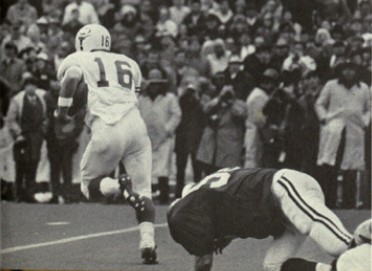
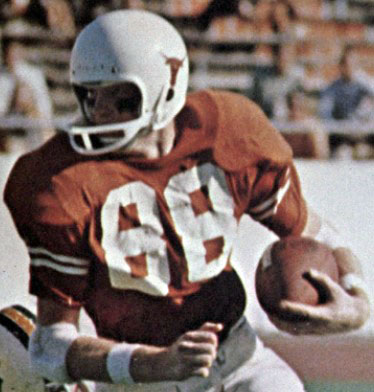
James Street sets sail on his scoring run. (University of Texas Cactus Yearbook - Class of 1970)
Interception Ends Razorback Drive
QB Bill Montgomery then led the Razorbacks on a 73y drive to the seven where they faced third down. Most observers expected a run to put the ball in the middle of the field for a field goal that would likely clinch the victory. However, Offensive Coach Don Breaux ordered a pass. Montgomery, under a heavy rush, threw short toward Dicus, and Danny Lester came up and intercepted in the end zone and ran the ball to the 20. All the Razorbacks accomplished was to run precious minutes off the clock and force the Longhorn starters to play in the final period for the third time all season.
After an exchange of punts, Texas got the ball at their 36. Still having problems running the ball, they faced fourth and three at the 43 with with 4:47 left. During the timeout, Royal told Street to run "Right 53 Veer pass." The play was a deep pattern to the tight end who would be the only receiver sent out. Since the play wasn't in the game plan package and long passes weren't Street's forte, he asked, "Are you sure that's the call you want?" "Damn right I'm sure!" Royal snapped. Later, the coach admitted he couldn't say why he called that play. "In a case like that, you just suck it up and pick a number. There's no logic to it. Just a hunch." It's been designed as "the most audacious call of his storied career."
Overhearing the play call, skeptical Defensive Coach Mike Campbell called his eleven together and told them, "Now, we're going to give them the ball in our end of the field. So we've got to stiffen up!"
"Greatest Catch in History" Ties Game
Street had noticed Arkansas defenders looking into the Texas huddle. So he looked at SE Cotton Speyrer while explaining the play to TE Randy Peschel. Street recalled, "Coach Royal doesn't know it to this day, but I gave Peschel a triple option. I told him if he thought he could get the three yards, stop, and beat his man to do it. I told him if he thought he could get open by cutting to the sidelines to do it ... and I told him if he thought he could beat his man deep to take off. I told the offensive line to give me time to read Randy."
Taking the snap, Jimmy saw that Randy was going deep. So just before being knocked to the turf by a rusher, he launched a spiral down the left side to Peschel, who made a difficult catch over his shoulder just over the outstretched fingers of two Razorbacks for 44y to the 13, where he was knocked out of bounds. Afterward, Street refused to take credit for the play. Instead, he said Peschel "made the greatest catch in the history of football."
RB Ernie Koy made up for losing two fumbles earlier by crashing 11y to the two. Then Jim Bertelson dived into the end zone. Happy Feller kicked the go-ahead point despite a high snap to give the Longhorns their first lead of the day.
Texas 15 Arkansas 14
Texas 15 Arkansas 14
Coach Royal later explained why he called the long pass to set up the go-ahead touchdown.
"They'd had a confusing defense for us. They had a stunt that we couldn't solve that day. We hadn't had but one or two running plays over three yards all day. They had pretty well shut us down, and time was running out. And I felt that if we did run the ball and make a first down, that we probably would not have the ability to sustain the drive because we hadn't been able to do it all day. I felt we had to get something big. It was time to really take the game. People talk about that being a brave call and a courageous call and a great call. If that pass had been incomplete, it'd been the most criticized call. They'd have said, 'It's stupid as hell. They're not a passing team. Should've been running the ball, pick up the first first down.' But we wewren't moving the ball that well. So I felt we had to gameble, had to go for it. We were behind. We had to do something.
"And I was hoping that it'd catch 'em by total surprise. I'll tell you how surprised they wewre. They had their safety men and their halfback all over Randy Peschel. I mean, he was as well covered as you could be covered. And when James Street threw the ball to Peschel, there were six hands going after the football, and all within probably six inches, maybe as little as an inch or two. And it happened to get into Peschel's hands, but the defensive people were all over the ball. One of them said that he thinks the ball grazed his fingertips as it went into Peschel's hand, so that's how close it was to be an unsuccessful play. And had it been unsuccessful, Lord knows they'd still be criticizing me."
"And I was hoping that it'd catch 'em by total surprise. I'll tell you how surprised they wewre. They had their safety men and their halfback all over Randy Peschel. I mean, he was as well covered as you could be covered. And when James Street threw the ball to Peschel, there were six hands going after the football, and all within probably six inches, maybe as little as an inch or two. And it happened to get into Peschel's hands, but the defensive people were all over the ball. One of them said that he thinks the ball grazed his fingertips as it went into Peschel's hand, so that's how close it was to be an unsuccessful play. And had it been unsuccessful, Lord knows they'd still be criticizing me."
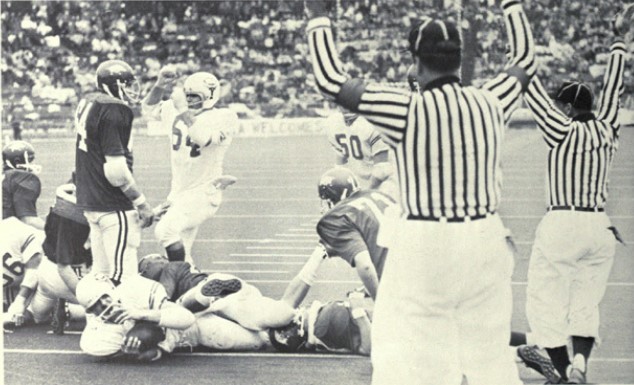
Jim Bertelson scores the tying touchdown. (University of Texas Cactus Yearbook - Class of 1970)
Interception Dashes Hogs' Hope
With 3:58 left, Arkansas had a chance to set up the winning field goal. Montgomery scared the Texas partisans by completing four passes to reach the Longhorn 39. He then floated a pass into the flat. Tom Campbell, the son of Texas' defensive Mike Campbell, grabbed the ball away from Rees for an interception that sealed the unforgettable victory.
Postgame
As promised, President Nixon came to the winning locker room and presented a "national championship" plaque. This action did not sit well in the state of Pennsylvania where Joe Paterno's Penn State Nittany Lions had completed their second straight undefeated season and expected to play Texas in the Cotton Bowl for the national championship. But both the Longhorns and Nittany Lions were flabbergasted by the opponent selected to face Texas in the Cotton Bowl.
#9 Notre Dame (8-1-1) decided to reverse its 44-year policy of not participating in bowl games. So Texas played the Fighting Irish in Dallas. Arkansas was matched against #13 Ole Miss in the Sugar Bowl while Penn State played #6 Missouri in the Orange Bowl.
Coach Royal later said that Texas was "lucky" to beat Arkansas. He believed Arkansas was better prepared emotionally and technically than Texas. He also thought the Razorbacks had outplayed his team.
Coach Broyles never looked at the game film.
References
Hook ‘Em Horns: A Story of Texas Football, Denne H. Freeman (1974)
I’ll Tell You One Thing: The truth about Texas, America and college football. With pictures to prove it. Dan Jenkins (1999)
Coach Royal: Conversations with a Texas Football Legend, Darrell Royal with John Wheat (2005)
Arkansas Football Yesterday & Today, Jim Brewer (2009)
Matt Jones, December 6, 2019, "Frank and Darrell: A Unique Rivalry," https:// wholehogsports.com
Hook ‘Em Horns: A Story of Texas Football, Denne H. Freeman (1974)
I’ll Tell You One Thing: The truth about Texas, America and college football. With pictures to prove it. Dan Jenkins (1999)
Coach Royal: Conversations with a Texas Football Legend, Darrell Royal with John Wheat (2005)
Arkansas Football Yesterday & Today, Jim Brewer (2009)
Matt Jones, December 6, 2019, "Frank and Darrell: A Unique Rivalry," https:// wholehogsports.com